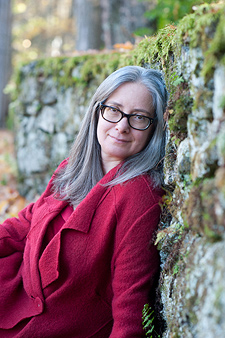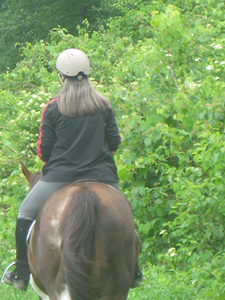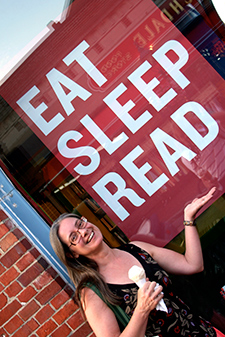About
 |
 |
 |
Chrysler Szarlan has jogged racehorses, performed as a magician's assistant, and worked as an attorney with the Connecticut Legal Rights Project. Her debut novel, The Hawley Book of the Dead, was named an NPR Best Book of 2014. Her essays have appeared in The Huffington Post, The Sunday Telegraph, and Whatever. She lives in western Massachusetts with her family, where she directs the Odyssey Bookshop's Write On! writing classes.
An interview with Chrysler and Rebecca Vnuk
of The American Library Association
RV: First of all, please tell us a little more about your new book, THE HAWLEY BOOK OF THE DEAD.
CS: When I first began writing the book, it was about an ordinary woman trying to keep her daughters safe. And then the magic began creeping in.
I think we all want magic in our real lives, and that's the tradition that the book is written in. Writers like Alice Hoffman, Neil Gaiman, Deborah Harkness all bring us that—the magical embedded in the real world.
Also, we're all called to be superheroes in our families, in our jobs, our communities, to take on a lot. And my heroine, Reve is kind of an everywoman that way. Even though she has a magical power, she tries to keep it contained within her stage illusions. She's practical, and wants to be a good wife, a good mother. She's suppressed her power in order to have a normal life, but then she's forced to come to terms with it, with who she truly is. That she is powerful. And she struggles with that. She wants to live a peaceful life, but is forced by circumstances to learn to use her powers. As we all are. I think that will resonate with a lot of readers.
RV: What did you do before becoming a writer? What inspired you to become a writer? CS: It was a long road. I've always written, I've always been a huge reader. When I was young, I wanted to be a writer or an actor, and was of course, discouraged from that. I also always rode and worked with horses. I worked on horse farms in high school and college, and then went on to law school. Which I loved. And I loved my job as an attorney representing clients in the mental health system in CT, when the state hospitals were closing. Helping clients transition into the real world, and with patient's rights issues. But then I got tremendously sick. I was diagnosed with fibromyalgia, and had to leave my job. Then I had a series of part-time jobs, just getting by. That was when I began to write again. And one of the part-time jobs was at the Odyssey Bookshop in South Hadley, Massachusetts, which I have loved, and still continue.
RV: How did you choose to write a supernatural story? CS: I live in New England, where ghost stories and the supernatural permeate the air. I always loved the haunted stories of Hawthorne, Edith Wharton, H.P. Lovecraft (who spent a lot of time in my home-town, and set some stories there. And Shirley Jackson, Stephen King, Alice Hoffman. I've been influenced by the creepy New England writers. And the haunted houses and landscapes. I get a lot of inspiration from walking or riding in the woods. Hawley Forest is a real place. And it has a kind of haunted feeling. Like many places in New England. It was once completely settled, but the farms were abandoned, as people gave up on trying to farm in such a rocky place. Now there are all these cellar holes, all over the forest, and it's easy to imagine the lives lived there. At least it is for me.
Also, magical elements are showing up in so much literature now. I think it shows how we're all having to come to grips with the 'magic' in our own lives, of the internet, all the technological advances of the past 20 years. We all are fascinated with it, and frustrated too. We don't think of it as 'magic' per se, but it kind of is, and we are all struggling to learn to use these new powers. I think that's one reason there are so many books that at least flirt with magic, or the supernatural.
RV: You were once a magician's assistant. Did this shape your story? CS: I was a terrible magician's assistant. Although I rode and ran and biked at the time, and thought of myself as a very physical person, it takes a dexterity and strength that I was totally lacking. You have to be able to cram yourself into tiny spaces, contort your body in ways that seem pretty unnatural. Not to mention the perfect timing you need. So I was a failure at that job, but it gave me a tremendous respect for stage magicians and their assistants. When I began writing this book, though, at first I had no idea that Reve was a magician. One day she just told me. Then I had got to do such lovely research. I read lots of Jim Steinmeyer, who is an amazing expert on the history of magic. And I re-read Robertson Davies' novels, his great Deptford Trilogy. Also, I read Robert-Houdin's and Houdini's "autobiographies" which were quite fun and over the top. I wanted to get Reve's voice right. I've acted quite a bit, too—I even applied to Yale's drama program, and of course didn't get in. When you're a performer, you have your normal, private self, and your exaggerated stage self. I wanted Reve to have those sides to her. She is a mom, and she is a performer. I wanted readers to experience both those elements of her personality.
RV: This is slated as the first in a series—could you imagine writing something different, or are you interested in staying on this path? CS: Yes, I'll stay with the series, I love these characters, and I'm committed to them, but I also have other books planned in the same setting, with some of the same characters appearing here and there. An interconnected kind of half-real half-fictional world of the Pioneer Valley of western Massachusetts. Like Stephen King's Castle Rock. A fictional world within the real world. But the series will also take me back to Las Vegas, and the desert surrounding it. Another really rich and haunted landscape.
RV: How do you create and sustain your characters? CS: They create and sustain me. They kind of take me over.
RV: What do you find to be the hardest part about writing? CS: Nothing. I love it all. Except revising alone. But I love the creative collaboration that working with my agent and editor has been.
RV: Tell us a bit about your writing process—how do you come up with your ideas, what's the process of writing a new novel, start to finish? CS: Again, it's kind of magical. I believe in magic in the real world, because my ideas seem to come up through the ground to me. I feel as if I'm just a conduit for the stories and characters. At least in the initial spurt of the first draft. Then later, in revision, I get to shape the story, but I always am searching for what's right for the story and the characters, even then. They always tell me, too.









